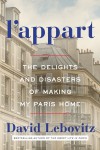19
Followers
19
Following
M Sarki
Besides being a poet with four collections published, M Sarki is a painter, film maker, and photographer. He likes fine coffee and long walks.
M Sarki has written, directed, and produced six short films titled Gnoman's Bois de Rose, Biscuits and Striola , The Tools of Migrant Hunters, My Father's Kitchen, GL, and Cropped Out 2010. More details to follow. Also the author of the feature film screenplay, Alphonso Bow.
Currently reading
L'Appart: The Delights and Disasters of Making My Paris Home
We Learn Nothing: Essays
Elmet: LONGLISTED FOR THE MAN BOOKER PRIZE 2017
Limbo, and Other Places I Have Lived: Short Stories
The Double Life of Liliane
At Home with the Armadillo
American Witness: The Art and Life of Robert Frank
Autumn
Inside Out: A Personal History of Pink Floyd (Reading Edition)
American Witness: The Art and Life of Robert Frank
How to Live, What to Do: Thirteen Ways of Looking at Wallace Stevens
 https://msarki.tumblr.com/post/168887258208/how-to-live-what-to-do-thirteen-ways-of-looking
https://msarki.tumblr.com/post/168887258208/how-to-live-what-to-do-thirteen-ways-of-lookingThis slim study is much more than what is blurbed and marketed by the publisher as a concise primer to the poetry of Wallace Stevens. Instead, the greater primer is to simply read his work. And if his poems resound, or connect to you in any way, further study may be warranted and result in your seeking out this book. But to begin here would be a grave mistake.
It is not ‘how’ things are in the world that is mystical, but that it exists.
Wallace Stevens is in the realm of American greats the like of Emily Dickinson. He too can make one’s head explode. He also makes sense.
Nonsense in grammatical form sounds half rational.
Stevens, through his poems, shaped a new language for us. He fashioned an instrument adequate in describing how to live and what to do in this strange new world of experience.
…’ditherings’ accompany each and every predication, the undertones and overtones of every color of the mind.
Steven’s ditherings see what was always seen but never seen before. Elicited as our necessary angel he offers individual solutions to the riddles of our existence on this planet. Having read and studied everything Stevens wrote and even read himself, Joan Richardson provides an advanced course a scholar might take in discovering an even better way into the mind and work of Wallace Stevens. But this is not the book to initially begin with. Too much would be lost on the unspoiled and uninitiated among us.
By reading through Stevens’s body of work we learn to become pragmatists…
How refreshing it is to be practical, to see things as they are. And the mystery, and joy, in imagining what could be. When perceived as dogmatic one becomes a bore. Wallace Stevens opens us to a more expansive, and much wilder, world.
Finally, he (Stevens) noted,
It is not an artifice that the mind has added to human nature. The mind has added nothing to human nature. It is a violence from within that protects us from a violence without. It is the imagination pressing back against the pressure of reality. It seems, in the last analysis, to have something to do with our self-preservation; and that, no doubt, is why the expression of it, the sound of words, helps us to live our lives…
Joan Richardson has produced for us a most distinctive and valuable tool in which to help us view the world through the eyes of Wallace Stevens. And in essence, Stevens provides us new glasses in which we may see for ourselves the possibilities that will always exist if we maintain the courage to keep looking.
Stevens’s poems are exercises in meditation, designed to loosen inherited, outworn habits of thought inappropriate to honoring the life of all things on the planet of which we are a part…







